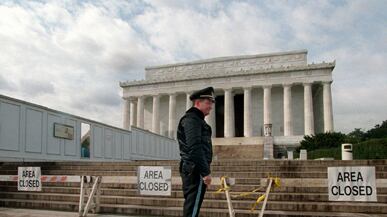Rep. Trey Gowdy, a House freshman backed by the Tea Party, knows all too well what a government shutdown might feel like—he survived the last one.
In 1995, Gowdy was a recently hired federal prosecutor in South Carolina. He recalls sitting down with a colleague and trying to make sense of the looming crisis. “My son was 2 years old, and at that time my wife didn’t work outside the home,” he said. “At the basest human level, I was just worried about how I would provide for my family.”
As a recent hire of a “pretty crusty” supervisor, Gowdy also was confused about whether he and his colleague were considered “essential.” The confusion didn’t last long.
“He assured us we were not,” Gowdy said.
That November 1995 shutdown lasted almost a week and left some 800,000 federal employees furloughed. A second shutdown in December 1995, which lasted into early 1996, prompted the furlough of some 240,000 workers. Afterward, Congress quickly approved back pay, and federal employees didn’t miss a paycheck.
But they didn’t know that would happen.
Even deemed nonessential, Gowdy came to work, not knowing if he’d be compensated. Like many people in their twenties and thirties, he says he was living from paycheck to paycheck. “The uncertainty and the angst in some ways was the worst part,” he said. “We thought, surely there are reasonable people who could get this resolved.”
How did it make him feel about Washington? “That there was a disconnect, a disconnect between the people who made decisions and those who had to live by them,” he said.
This week he’s surrounded by employees as anxious as he was back then. An Ethiopian woman who works at the House cafeteria and is trying to put herself through school has been looking nervous all week, he said. “Finally this morning she asked me—do you think I’ll be coming to work on Monday?” Gowdy said he wishes he had an answer.
Another government worker who survived the 1995 shutdown is Christine Chitwood, now a Drug Enforcement Administration analyst and back then a Pentagon secretary. She and her fellow workers had to come in for four hours of work the day they were told they were being officially furloughed and were not told until the last minute whether they were considered “essential.”
“That caused a lot of morale problems,” said Chitwood. Her top superior at the time, she said, was presidential appointee. He was deemed nonessential, but his No. 2 had to report to work unpaid. “Ego-wise, the furloughs did not go over well.”
How did it make Gowdy feel about Washington? “That there was a disconnect... between the people who made decisions and those who had to live by them.”

That said, “It’s terrible to admit it, but there was a part of me that was ready for the vacation. I was pretty sure we’d get paid and all my co-workers felt the same. It’s kind of the same way now. We could all use a few days off,” she added. What is irksome, though, as it was for Gowdy, is being kept in the dark: “No one likes the down-to-the-wire aspect of this. Tell us or don’t, but get it over with.”
To Chitwood, the distance between Washington and working people appears vast. “It feels like no one really cares about us; we’re just little people down here while they act like children in a playground up there,” she said. “I had a supervisor today say they wanted a revolution, to fire everyone in Congress and just start over.”
For his part, Rep. Gowdy is hoping he can help bridge the gap this time around. The shutdown was horrible for him in 1995, but he said he’s caught in an equally tough spot this time.
“Surely to goodness reasonable-minded people can get this resolved,” he said. “I can’t go back to South Carolina and say that we failed to cut one-thirtieth of our deficit but we’re somehow still serious about fiscal policy. How can I convince people of that?”
Eve Conant is a Newsweek staff reporter covering immigration, politics, social and culture issues.






